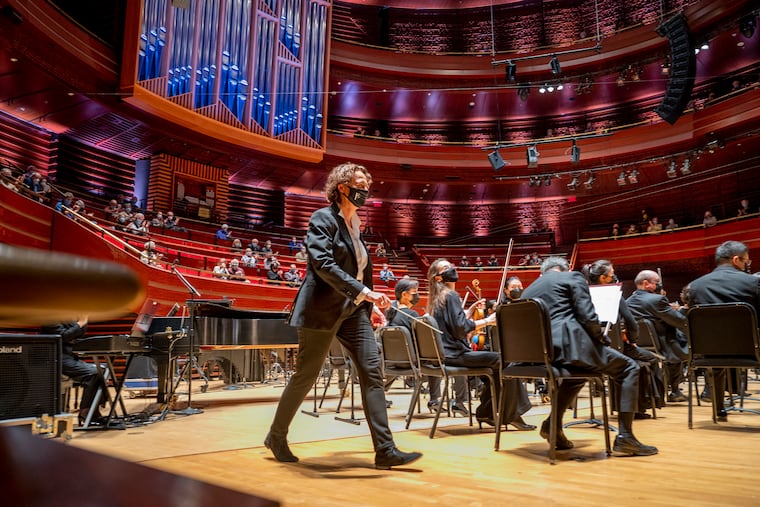Traditionalists will love this program with pianist Emanuel Ax and the Philadelphia Orchestra
Principal guest conductor Nathalie Stutzmann returns for a program of Beethoven and Brahms.

Sometimes you just need a little Beethoven and Brahms in your life. The Philadelphia Orchestra spends a lot of time these days ushering new works into the repertoire or creating the sense of event around concerts — like a program next month that aims to tell us what Brahms and Radiohead have to say to each other.
But Thursday night was for traditionalists: the magisterial but unfailingly elegant Emanuel Ax in Beethoven’s Piano Concerto No. 4, and the emotional punch of Brahms’ Symphony No. 4.
Orchestra principal guest conductor Nathalie Stutzmann was on the podium, asking pointed musical questions about why this or that phrase was always taken this way and whether there might be a better way to do it. The answers were mostly convincing.
Her Brahms was powerful and sculpted with fine contours. There was also a sense that more precise interpretive choices might come later in her development. It wasn’t clear what effect she was going for in the section after the fourth movement’s great flute solo (played by Jeffrey Khaner); it came across as merely rushed.
But for the most part, and to the general benefit of sweep and meaningful phrasing, Stutzmann’s vision was quite compelling. For several bars in the first movement, she stopped beating time altogether, instead making a gesture like she was pulling something out of the orchestra. Often she got it.
She chose her moments for drama, knowing that too much full-pitch emotion can paradoxically sap the piece of its sweetness or fire. In places, she seemed less interested in using the singing style for which she is often noted — she is also a contralto — in favor of emulating an organ. In the second movement, where the strings come in with the expressive theme robed in ultra-rich colors, she knew that all she had to do was sit back and let this orchestra do what it does best.
The Brahms symphony is a big piece for the brass, and horns in particular, and after Shostakovich Symphony No. 5 last week in which principal hornist Jennifer Montone made you remember what a treacherous instrument it is, she more than made up for it in the Brahms.
Stutzmann deferred to the pianist in Beethoven’s Piano Concerto No. 4 — and, really, when you have Ax as your soloist, why shouldn’t you? Authoritative and polished, he suavely molded his approach to the switching character of the first movement. His sound in the cadenza had a gorgeous sheen, and then, in the moments after the orchestra joins back in, the sheen deepened to a lovely glow. Ax is not a showy pianist, but there is always a charisma at work.
It was present Thursday even in the most unshowy of Chopin. As an encore, Ax chose the Nocturne in F minor (Op. 55, No. 1). Its relatively unchallenging technical demands make it a favorite for amateurs. So was there a deeper meaning here? Ax — born in Lviv, Ukraine, and raised in Warsaw, Poland, Winnipeg, Canada, and New York — often reduced the music to a hush. There’s something lonely about the main theme, like a friendless soul on a trek, and shrinking the sound emphasized the air of solitude. Ax’s intent in playing this piece now may have had nothing to do with the horrors playing out in Ukraine, but from the listener’s perspective, teasing apart music and the larger world seemed both difficult and unnecessary.
Additional performance: Saturday at 8 p.m. in Verizon Hall, Broad and Spruce Streets. Tickets are $10-$165. philorch.org, 215-893-1999.